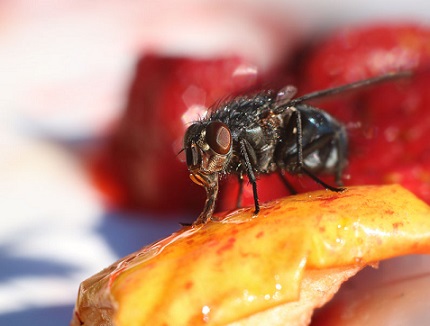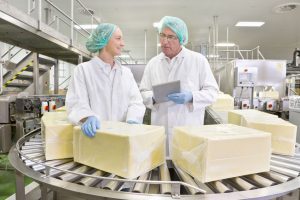
‘Aldi customer finds half a rat in packet of frozen vegetables’
This is not a headline that anyone operating a business wants to read.
According to the Food Standards Agency, around 500,000 people suffer from food poisoning each year and these are just the ones who have reported it. Many of these cases would not have arisen if the relevant Food Safety training had been undertaken and safe practices adhered to.
Food safety is a scientific discipline describing the handling, preparation, and storage of food in ways that prevent food borne illness. Over time, scientists and food professionals have developed a number of routines that should be followed to avoid potentially severe health hazards.
To protect both customers’ health and themselves, businesses and food establishments must adhere to the minimum legal requirements in order to meet the required Food Safety standards. All staff should be trained in order to practice all the safe methods that are relevant to the job they do. Measures should also be in place within the business to ensure staff are supervised to check they are following the safe methods properly.
adhere to the minimum legal requirements in order to meet the required Food Safety standards. All staff should be trained in order to practice all the safe methods that are relevant to the job they do. Measures should also be in place within the business to ensure staff are supervised to check they are following the safe methods properly.
Although there is no statutory requirement for food safety qualifications no food business wants a food hygiene headline horror as the bad publicity has a very negative effect on trade, or can even close the business, as with ‘Mill Road takeaway shut down after cockroach infestation’. In the case of Aldi and half a rat in the frozen vegetables, the Guardian reported that all orders for the product were suspended pending an investigation. Frozen food came under the spotlight again when the BBC reported that Greenyard Frozen UK Ltd recalled 43 products from UK supermarkets due to fears over listeria, which is estimated to make around 1,600 people unwell a year and kills around 260 each year.
As part of their remit to protect the public, Environmental Health Officers (EHO) inspect businesses for health and safety, food hygiene and food standards. They follow up on complaints and investigate outbreaks of food poisoning, infectious disease or pests and will enforce environmental health laws when required. Although there is no statutory requirement to have food safety qualifications, part of the EHO officer inspections will be looking to see that the knowledge, experience and training level of individuals involved in food preparation is relevant and relative to the job role and position.
 All food businesses must, by law, have a Food Safety Management System in place and this should serve as the backbone to the operational practices that take place. These systems should be based on HACCP (hazard analysis and critical control points). In simple terms, this process should identify any potential areas of concern and direct the business to define procedures and processes that will eradicate, control or limit them.
All food businesses must, by law, have a Food Safety Management System in place and this should serve as the backbone to the operational practices that take place. These systems should be based on HACCP (hazard analysis and critical control points). In simple terms, this process should identify any potential areas of concern and direct the business to define procedures and processes that will eradicate, control or limit them.
Implementing some standard food safety training in any hospitality business will not only protect the public, business owners and the employees but could well be the difference between closures, prosecution and even, in the case of The Railway Hotel, death and imprisonment. The owners and managers of the Railway Hotel in Hornchurch, Essex, were fined £1.5 million after being found guilty of placing unsafe food on the market after a Christmas dinner served at their restaurant left a mother dead and dozens of other diners ill with food poisoning.’
Our Top Three Recommendations for Food Safety Training:
-
-
Food Hygiene – In the UK, food handlers don’t have to hold a food hygiene certificate to prepare or sell food, but it is highly recommended that they do. We recommend that food handlers undertake the basic food hygiene training package which teaches the learner safe working practice and provides an understanding of the importance of food safety standards.
-
Allergen Awareness – in 2014 new laws came in making it a legal requirement for caterers and restaurant owners to display to customers information concerning 14 common allergens or risk a fine of up to £5,000. We recommend that all those selling and serving food have an understanding of allergens and the law.
-
HACCP – Businesses involved in the production, preparation or sale of food have a moral and legal obligation to ensure the safety of the food served. In order to create internal standards which will ensure safe food operations, a business must have a Food Management System. We recommend that all those involved in food preparation undertake the appropriate level of HACCP training. An understanding of Hazard Analysis Critical Control Planning (HACCP) will enable a business to put this at the heart of its Food Management System.
-
All the recommended training courses are easily accessible as online learning and can be purchased through the eLearning Marketplace and come with free use of a learning management system.
Click on the image below to view all our Level 1 to 4 Food Safety and HACCP Online Courses
 If you are a business owner requiring multiple purchases of each course then do contact us direct on 01488 580177 or email enquiries@elearningmarketplace.co.uk and we would be very happy to put together a bespoke proposal to meet your training requirements.
If you are a business owner requiring multiple purchases of each course then do contact us direct on 01488 580177 or email enquiries@elearningmarketplace.co.uk and we would be very happy to put together a bespoke proposal to meet your training requirements.
eLearning Marketplace has a catalogue of over 2,000 online courses covering compliance, professional development and vocational qualifications. We offer a price match guarantee on advertised prices, a FREE learning management system to track, evidence and manage training and a FREE Licence Manager app to manage course licences.
Not all courses are on the website so if you can’t find what you are looking for please do get in touch: 0844 854 9218
Sources:
www.thefoodsafetysystem.com
www.food.gov.uk
https://www.bbc.co.uk/news/uk-england-44739472
https://www.theguardian.com/uk-news/2018/feb/05/aldi-customer-finds-half-a-rat-in-packet-of-frozen-vegetables
https://www.cdc.gov/listeria/index.html







 UK: 0844 854 9218 | International: +44 (0)1488 580017
UK: 0844 854 9218 | International: +44 (0)1488 580017








